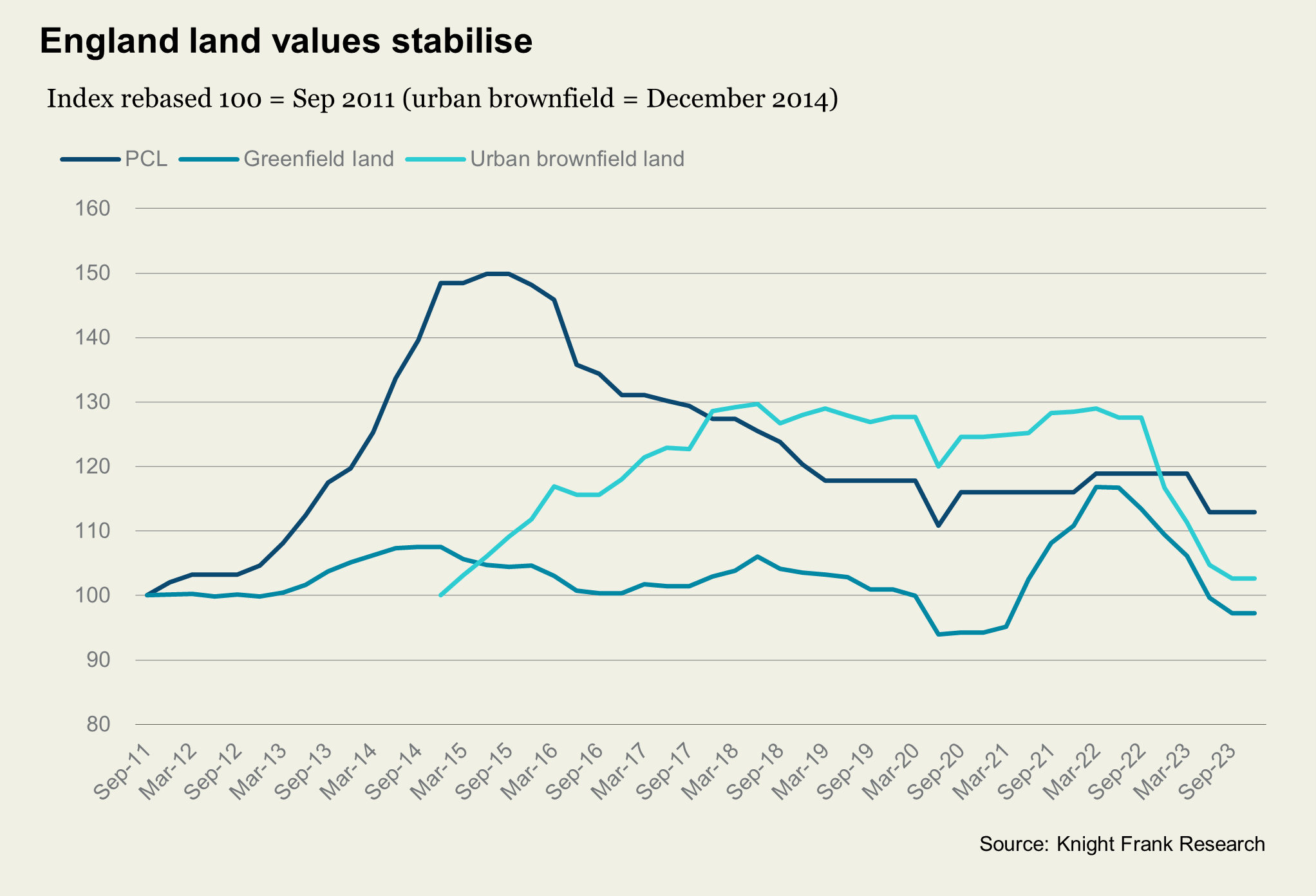UK rural property: A fair deal for farmers
The Knight Frank Rural Property and Business Update – Our weekly dose of news, views and insight from the world of farming, food and landownership
11 minutes to read
Opinion
It’s kind of ironic that just as the government’s mandatory biodiversity net gain (BNG) scheme finally goes live across England and wheat prices continue to slide, Farming Minister Mark Spencer is mooting a cap on the amount of land that farmers can enter into the Sustainable Farming Initiative (SFI) due to food security concerns. Most farmers want to produce food, but on lower-yielding land where the margins no longer stack up without the Basic Payment Scheme (BPS), environmental initiatives such as SFI and BNG make sense. Individual farmers have not signed an agricultural equivalent of the Hippocratic oath making them responsible for the nation’s food security, so if that is what the government wants them to deliver there needs to be a proper national land-use strategy with the right incentives in place. Nobody should be expected to run their business at a loss. If we want more food grown here somebody will have to pay for it.
Do get in touch if we can help you navigate through these interesting times. You can sign up to receive this weekly update directly to your email here.
Andrew Shirley Head of Rural Research
In this week's update:
• Commodities – Using your loaf
• BNG – Net gain rules now in place
• Tenancy reform – Have your say
• Levy costs – AHDB rates rise
• No fault evictions – Gove says go
• BNG – plus 10% not enough says NGO
• ELMs – Acreage caps mooted
• Food systems – Reform could save trillions
• International news – US carbon doubts
• Dog worrying – New powers promised
• Fore! – Essex leisure opportunity
• Exmoor – More acres available
• Development land – Market stabilises.
• Farmland prices – 2023 ends on a high
• Country houses – 2023 better than expected
• Residential – Our forecasts revised
• The Rural Report – Watch the videos
Commodity markets
Commodities – Using your loaf
Arable farmers who’ve stuck with milling wheat are seeing some rewards as £70/t premiums are now available over the price of grain destined for the feedlot. Feed wheat prices dropped again last week due to slow demand, uninterrupted wheat exports from the Black Sea and no tangible weather issues, according to trader Frontier. London feed wheat futures have shed £25/t in value since the end of 2023 and there seems little in sight at this stage to arrest the current trend. Straw prices, however, are heading in the opposite direction off the back of limited supply with prices over £100/t being quoted, according to Farmers Weekly. Meanwhile, the continued Houthi attacks on Red Sea shipping and the resulting US-led retaliation seem to have finally compensated for slow global demand in the eyes of oil traders. Pump prices started to edge up last week.

Need to Know
BNG – Net gain rules now in place
England’s delayed Biodiversity Net Gain regime finally becomes mandatory today affecting the majority of residential and commercial property developments. Developers will have to replace any biodiversity lost plus at least 10%, either on-site as part of the development or by paying somebody else to provide it for thirty years. This presents an obvious opportunity for farms and estates, but my Kent colleague Jamie Evans-Freke, who has already set up some deals between developers and landowners, warns BNG will not necessarily be the silver bullet to replace lost BPS payments. “There will be an initial surge of demand from developers who already have schemes in the pipeline, but for future projects I expect a lot of BNG to be built into schemes on-site and factored into land values.” If too many BNG sites are put forward it could also push down the price of each unit, Jamie reckons. “Farmers and landowners should consider BNG and other natural capital solutions holistically, with a focus on integrating nature recovery into their businesses using less productive land,” adds another colleague Rachel Patch. Check out our handy BNG guide and Rachel’s video to find our more.
Tenancy reform – Have your say
Those wanting to comment on a new draft Code of Practice setting out socially responsible behaviour for landlords, occupiers, and agents have until the end of February to submit their thoughts. The aim of the code, suggested as part of the Rock Review, is to encourage more collaborative tenant-landlord relationships. Alastair Paul of our Rural Consultancy team, who is a strong advocate for more equitable relationships, says he supports the code. “There is bad practice around from both sides of the advisory fence and there are lots of issues to be worked though on tenancies as the new unsupported world beds in. A similar code in Scotland seems to have been helpful to all.”
Meanwhile, the newly released results of a member survey by the Tenant Farmers’ Association (TFA) highlight the strained relationships between tenants and their landlords, with 30% of respondents saying they felt harassed.
Levy costs – AHDB rates rise
The rates that farmers and food processors pay to the AHDB for the research it does are going to rise sharply from April after remaining unchanged for up to two decades. Cereal producers will pay 58p/tonne, up from 46p; while beef farmers will see their levy go from £4/head to £5/head. See the full list of revised payments.
No fault evictions – Gove says go
I don’t usually watch Laura Kuenssburg’s show on Sunday, but yesterday I just caught her extracting a promise out of Housing Minister Michael Gove that Section 21 no-fault evictions would be banned before the next general election. “We will have outlawed it and we will have put money into our courts,” he said. As reported here, the move had been put on hold last autumn with a lack of capacity in the court system blamed, but campaigners feared it was going to be delayed indefinitely.
Dog worrying – New powers promised
Former Defra Minister Thérèse Coffey didn’t go down too well with farmers, but she looks keen to make amends by sponsoring a private members bill that will give the police more powers to prosecute the owners of dogs suspected of attacking livestock. The bill received full government backing during its second reading earlier this month.
Talking points
BNG – plus 10% not enough says NGO
The Wildlife and Countryside Link (WCL), an umbrella group for over 80 environmental and countryside charities and groups, is claiming that new mandatory BNG targets (discussed above) are not enough and is calling on councils to go beyond the +10% requirement. Based on Freedom of Information requests sent to the 317 local authorities in England, WCL says just 26 local authorities have either committed to, or are considering, BNG requirements above the mandatory requirement of 10%. Two - Guildford & Worthing - have adopted BNG policies of 20% into their local plans, while 18, including East Devon, Canterbury and West Oxfordshire have emerging BNG policies above 10%. These range up to 30% for Kingston Upon Thames and Tower Hamlets. A further six local authorities including Birmingham, Herefordshire and Greater Cambridge are seriously considering BNG policies above 10%. Just 24 authorities were found to have active targets on BNG ahead of the 10% rule becoming mandatory today, with the vast majority at or around 10%.
ELMs – Acreage caps mooted
Talking at the Norfolk Farming Conference, Farming Minister Mark Spencer said Defra might need to consider taking action if too many farmers put too much of their land into environmental schemes like the Sustainable Farming Initiative (SFI). Responding to a questioner who pointed out that some SFI options are now more profitable than growing crops and wondered whether Defra was concerned too much land might be taken out of food production, the minister said: “We want to see a balance between landscape, the environment and food on the shelf. If people do start taking the mickey we will have to take action to stop that from happening.”
Food systems – Reform could save trillions
Transforming “broken” global food systems could create US$5-10 trillion of economic benefits every year, according to a new report from the Food System Economics Commission. Echoing a recent report from the UN, the study calculates food systems are currently destroying more value than they create – with inefficient and fragmented policies leading to hidden health and environmental costs upwards of US$10 trillion every year, equivalent to 10% of global GDP. The cost of transformation, it claims, is small compared to its multi-trillion dollar benefits.
The report outlines five broad areas of action to achieve food system transformation by 2050. These strategies should include:
• Taxing production of the most damaging and unsustainable foods
• Realigning agriculture and food industry subsidies
• Encouraging healthier and more sustainable diets, tailored to local needs
• Investing in innovation to develop new agricultural technologies
• Ensuring nobody is left behind by targeting those most vulnerable, such as women farmers
International news – US carbon doubts
About 8% of US farmers have been approached by firms wanting to buy their carbon, according to the latest Ag Economy Barometer report from Purdue University. Most who had engaged in recent discussions said they were offered a payment rate of less than US$10 per metric ton. Relatively few farmers have taken up the offer to trade carbon due to a perceived low return on the effort required to make the necessary changes to their businesses.
On the market
Fore! – Essex leisure opportunity

Our Bishop’s Stortford Rural Consultancy team has an exciting opportunity that could appeal to a rural entrepreneur looking to start a new leisure business on a former golf course. The team is renting 30 acres of irrigated land at Clays Lane, formerly the nine-hole Loughton Golf Course, which also includes a hardstanding car park and the footprint of a club house, restaurant, bar, pro shop and auxiliary storage that were demolished after a fire at the property in 2021. “The property offers a commercial opportunity for a long-term lease allowing for the development of a new business venture which could include the redevelopment of the existing building footprint,” says my colleague Henry McNeil Wilson, who is helping to handle the deal.
Exmoor – More acres available

If you’re looking for some natural capital potential in the south-west of England, picturesque Emmetts Grange could fit the bill. It includes 748 acres of pastureland and moorland on Exmoor, near Simonsbath, and offers significant environmental opportunities alongside traditional farming. The land is available as a whole or in five lots ranging from 37 acres of pasture to 256 acres of moorland. The overall guide price is £3.5 million. Contact Alice Keith for more details.
Our Latest Property Research
Development land – Market stabilises

Newly released figures from the Knight Frank Residential Land Index show that England greenfield and urban brownfield values were flat in Q4 2023 compared with the previous quarter. Previously, urban brownfield values had fallen by 20% since the most recent peak of the market in the first quarter of 2022 up to Q3 last year, with greenfield down 17% during the same period. Greater economic confidence and a slowdown in the rise of build costs helped underpin values, says my colleague Anna Ward. Read her full report for more numbers and insight.
Farmland prices – 2023 ends on a high
The Q4 2023 instalment of the Knight Frank Farmland Index has now been published. The average value of bare agricultural land rose by 2% in the final quarter of the year to break the £9,000/acre barrier for the first time. Annual growth was 7%, which outperformed a number of other asset classes. Our research suggests values may flatten out this year, but supply remains limited and demand robust. Read the full report for more insight and analysis.
Country houses – 2023 better than expected
Kate Everett-Allen, our international residential research guru, has added the country homes market to her portfolio and has a bit of good news to report. “Prime country house prices declined by 5.8% in 2023. While this figure represented a sizable correction after two stellar years of growth, the rate of decline was lower than our forecast of -7% for the year. A growing sense that mortgage rates are at, or close to their peak, began to influence market sentiment towards the end of the quarter – a theme we expect to build this year. That’s not to say prices and sales volumes will bounce back strongly. Although the Bank of England opted to hold interest rates at 5.25% in December, the cost of borrowing remains at a 15-year high.” Read Kate’s full report.
Residential – Our forecasts revised
Better-than expected inflation figures leading to lower mortgage rates mean my research colleagues have revised their forecasts upwards for the wider UK housing market. Head of UK Residential Research Tom Bill says: “We now expect UK mainstream prices to rise by 3% in 2024, which compares to a decline of 4% predicted in October. With low-level single-digit growth in subsequent years, we expect cumulative growth of 20.5% in the five years to 2028.”
The Rural Report – Watch the videos!
You've read the book, now watch the videos! To complement the thought-provoking articles contained within the 2023/2024 edition of The Rural Report our whizzy Marketing team has also created a series of videos featuring many of the report's contributors. Head to our very own YouTube channel to discover more about biodiversity net gain and regenerative farming; find out how we are helping Guy Ritchie's Ashcombe Estate on its diversification journey; and read about the travails of an entrepreneurial Zimbabwean searching for a farm for his family. Plus, lots more.